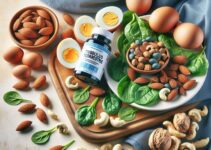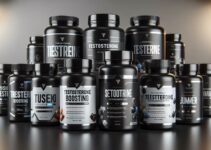You may not realize it, but the key to maintaining healthy testosterone levels could be as simple as ensuring you're getting the right vitamins and minerals in your diet. From Vitamin D to Zinc, these nutrients play crucial roles in supporting your body's natural testosterone production. But there's more to it than just popping a multivitamin. Understanding the specific benefits and dosages of each nutrient is essential for optimizing your testosterone levels. So, let's explore the key vitamins and minerals that could make a significant difference in supporting your testosterone levels.
Key Takeaways
- Adequate intake of vitamin D is important for healthy testosterone levels and immune function.
- Zinc is crucial for maintaining healthy testosterone levels and overall hormonal balance.
- Adequate magnesium levels are crucial for testosterone production and hormonal balance.
- Vitamin B6 plays a crucial role in testosterone production and hormonal balance.
Vitamin D
To support healthy testosterone levels, ensure you are getting an adequate intake of vitamin D through sunlight exposure and dietary sources. Vitamin D plays a crucial role in hormonal balance and immune function. Sun exposure is a primary source of vitamin D as it triggers the skin to produce this essential nutrient. Aim for 10-30 minutes of sunlight exposure on large parts of your skin, without sunscreen, several times per week. However, factors such as location, time of day, season, and skin pigmentation can affect the body's ability to produce vitamin D from sunlight. Consequently, supplementation may be necessary, especially for those who live in areas with limited sunlight or have darker skin. Additionally, incorporating vitamin D-rich foods into your diet, such as fatty fish, egg yolks, and fortified dairy products, can also contribute to maintaining optimal vitamin D levels. Ensuring adequate vitamin D intake is crucial for supporting healthy testosterone levels and promoting overall well-being by contributing to immune function and maintaining hormonal balance.
Zinc
Ensuring adequate intake of zinc is essential for maintaining healthy testosterone levels and supporting overall hormonal balance and immune function. Zinc plays a crucial role in numerous physiological processes, including protein synthesis, enzyme function, and immune system regulation. When it comes to testosterone support, zinc is a key mineral that should not be overlooked. Here are some important points to consider about zinc:
- Zinc and Testosterone Production: Zinc is involved in the regulation of testosterone production. It is a vital component of the molecular structure of testosterone receptors, and low zinc levels can lead to decreased testosterone production.
- Zinc Supplementation: For individuals with zinc deficiency or those at risk of deficiency, supplementation may be necessary to ensure optimal testosterone levels. However, it is essential to consult with a healthcare professional before beginning any supplementation regimen.
- Zinc Deficiency Symptoms: Symptoms of zinc deficiency can include decreased immune function, impaired wound healing, loss of appetite, and low energy levels. Monitoring these symptoms can help identify potential zinc deficiencies and address them promptly.
Magnesium
Maintaining adequate levels of magnesium is crucial for supporting testosterone production and overall hormonal balance, as it plays a vital role in various physiological processes within the body. Magnesium is involved in the regulation of testosterone levels and has been shown to positively influence anabolic hormonal status. Research indicates that magnesium supplementation may lead to increased testosterone levels, particularly in individuals with low magnesium status. Additionally, magnesium helps to regulate cortisol levels, which can have an impact on testosterone production.
Incorporating magnesium-rich foods into your diet is a great way to naturally support testosterone levels. Foods such as spinach, almonds, cashews, and pumpkin seeds are excellent sources of magnesium. However, if you struggle to consume enough magnesium through diet alone, supplementation may be a viable option. When choosing a magnesium supplement, look for forms such as magnesium citrate, magnesium glycinate, or magnesium aspartate, as these are more easily absorbed by the body. It's important to consult with a healthcare professional before starting any supplementation regimen to determine the appropriate dosage for your individual needs.
Vitamin B6
Vitamin B6, also known as pyridoxine, plays a crucial role in the production of testosterone. It is involved in the regulation of the androgen receptors in the body, which are responsible for the uptake of testosterone. Additionally, Vitamin B6 is essential for the synthesis of neurotransmitters that influence mood and energy levels, which are also linked to testosterone production.
Benefits of Vitamin B6
With its role in neurotransmitter synthesis and regulation of hormone activity, Vitamin B6 plays a crucial role in supporting overall health and well-being. Vitamin B6 offers various benefits, including:
- Hormonal Balance: Vitamin B6 is essential for the regulation of hormonal activity, particularly in relation to testosterone production, which is crucial for maintaining healthy hormone levels and overall well-being.
- Metabolism: It plays a vital role in the metabolism of amino acids, carbohydrates, and lipids, which are essential for energy production and overall metabolic function.
- Neurotransmitter Production and Cardiovascular Health: Vitamin B6 is involved in the production of neurotransmitters such as serotonin and norepinephrine, which are important for mood regulation. Additionally, it supports cardiovascular health by helping to regulate homocysteine levels, which is a marker for heart health.
Food Sources
Playing a vital role in various bodily functions, including hormonal balance and neurotransmitter production, Vitamin B6 can be obtained through a variety of food sources. Foods rich in Vitamin B6 include poultry (such as chicken and turkey), fish (such as tuna and salmon), organ meats (such as liver), starchy vegetables (such as potatoes), and non-citrus fruits (such as bananas). Incorporating these foods into your diet can help ensure adequate Vitamin B6 intake. To maximize the benefits of supplementation, consider cooking with vitamin-rich foods. For example, try preparing a meal with a combination of chicken, potatoes, and vegetables, or incorporating salmon into your diet. By doing so, you can naturally boost your Vitamin B6 levels and support overall hormonal health.
Recommended Daily Intake
For optimal hormonal health, it is important to ensure that your daily intake of Vitamin B6 meets the recommended levels for adults, as determined by scientific and clinical research. Vitamin B6 plays a crucial role in testosterone production, especially as you age. Here is the recommended daily intake of Vitamin B6 for adults:
- For men aged 19-50: 1.3 milligrams per day
- For men over 50: 1.7 milligrams per day
- For women aged 19-50: 1.3 milligrams per day
Studies have shown that adequate levels of Vitamin B6 can support healthy testosterone levels, especially when combined with regular exercise. Ensuring you meet the recommended daily intake of Vitamin B6 is essential for supporting optimal testosterone production and overall hormonal balance.
Vitamin K2
Vitamin K2 plays a crucial role in regulating calcium metabolism and promoting bone health by activating proteins that help direct calcium to the bones and teeth, where it is needed most. This vitamin is known for its benefits in cardiovascular health and bone mineralization. It works synergistically with vitamin D3 and calcium to support bone density and reduce the risk of fractures. Vitamin K2 also plays a role in supporting testosterone production, making it an important nutrient for overall men's health.
Vitamin K2 Benefits and Sources
| Benefits | Sources |
|---|---|
| Supports bone health and mineralization | Natto, fermented cheese, egg yolks |
| Promotes cardiovascular health | Grass-fed dairy, chicken, beef liver |
| Aids in testosterone production | Chicken, pork, sauerkraut |
| Regulates calcium metabolism | Fermented foods, leafy green vegetables |
Incorporating a variety of these sources into your diet can help ensure you are getting adequate levels of vitamin K2 to support your testosterone levels and overall health.
Boron
Regulating hormone levels is crucial for maintaining overall men's health, and now we turn our attention to the role of boron in this process. Boron is a trace mineral that has gained attention for its potential impact on testosterone levels. Here's how boron supplementation may support testosterone levels:
- Increased Free Testosterone: Boron may play a role in increasing the levels of free testosterone in the body. Free testosterone is the form of the hormone that is readily available for use by the body's cells and tissues.
- Hormone Regulation: Research suggests that boron may help regulate the body's natural production of hormones, including testosterone. This regulatory effect could contribute to overall hormonal balance in men.
- Bone Health: Boron is also linked to bone health, and maintaining strong and healthy bones is crucial for overall well-being, especially as men age. By supporting bone health, boron indirectly contributes to the overall health and vitality of men.
When considering boron supplementation for testosterone support, it's essential to consult with a healthcare professional to determine the appropriate dosage and ensure it aligns with individual health needs and goals.
Vitamin C
You'll benefit from understanding the role of vitamin C in supporting testosterone levels. This essential nutrient is involved in the synthesis of steroid hormones, including testosterone, and also acts as an antioxidant to protect the testes from oxidative stress. Foods rich in vitamin C, such as citrus fruits, bell peppers, and strawberries, can help you meet the recommended daily intake for this important nutrient.
Benefits of Vitamin C
To optimize testosterone support, ensuring adequate intake of Vitamin C is essential for maintaining overall health and supporting the body's natural processes. Vitamin C offers numerous benefits that are crucial for your well-being:
- Antioxidant properties: Vitamin C acts as a potent antioxidant, protecting your cells from damage caused by free radicals. This is particularly important for your immune system, as it helps to fend off infections and supports overall immune function.
- Collagen synthesis: Vitamin C is essential for the synthesis of collagen, a protein that plays a vital role in maintaining the health of your skin, connective tissues, and bones. Adequate levels of Vitamin C support skin health and help in wound healing.
- Cardiovascular support: Vitamin C also supports cardiovascular health by promoting healthy blood vessel function and aiding in the maintenance of healthy blood pressure levels.
Food Sources of Vitamin C
Ensuring adequate intake of Vitamin C is pivotal for testosterone support, and one of the most effective ways to achieve this is through consuming a variety of food sources rich in this essential nutrient. Vitamin C plays a crucial role in hormone regulation, particularly in the production of testosterone. This potent antioxidant helps combat oxidative stress, which can otherwise impair testosterone production. Additionally, Vitamin C aids in the absorption of iron, a mineral essential for testosterone synthesis. Including Vitamin C-rich foods in your diet can offer numerous benefits, such as improved immune function, collagen synthesis for tissue repair, and enhanced cardiovascular health. Here are some excellent food sources of Vitamin C:
| Food Sources | Vitamin C Content (per 100g) |
|---|---|
| Oranges | 53.2 mg |
| Bell Peppers | 80.4 mg |
| Kiwifruit | 92.7 mg |
Recommended Daily Intake
When determining the recommended daily intake of Vitamin C, it is crucial to consider its role in supporting testosterone levels and overall physiological function. Adequate Vitamin C intake is essential for maintaining hormonal balance and optimizing testosterone production. The recommended daily intake for Vitamin C varies based on age, sex, and specific health conditions. For adults, the recommended daily intake is 90 mg for men and 75 mg for women. However, for individuals who engage in intense physical activities or are exposed to environmental stressors, higher doses may be necessary. It's also important to note that Vitamin C works in conjunction with other nutrients, such as zinc and vitamin D, to support testosterone production. Incorporating Vitamin C-rich foods into your diet and following exercise routines for hormone balance can help ensure adequate intake for optimal testosterone support.
D-Aspartic Acid
D-Aspartic Acid plays a crucial role in supporting testosterone production in the body by stimulating the release of luteinizing hormone, which in turn triggers the testes to produce more testosterone. This amino acid is known for its potential to increase testosterone levels, which can have a positive impact on exercise performance, muscle mass, energy levels, cognitive function, fertility, libido, mood, aging, and hormone regulation. Research suggests that D-aspartic acid supplementation may support the body's natural testosterone production, leading to potential benefits in various aspects of health and wellness.
| Benefits of D-Aspartic Acid |
|---|
| Increased Testosterone Levels |
| Improved Exercise Performance |
| Enhanced Muscle Mass |
| Heightened Energy Levels |
| Support for Cognitive Function |
D-Aspartic acid's ability to influence testosterone levels may also contribute to improved fertility and libido. Furthermore, it is believed to play a role in mood regulation and may offer potential benefits in addressing age-related declines in hormone levels. As with any supplement, it is important to consult with a healthcare professional before considering D-aspartic acid supplementation, especially if you have any existing health conditions or are taking medications.
Frequently Asked Questions
Can Taking a Combination of These Vitamins and Minerals Actually Increase Testosterone Levels Significantly?
Taking a combination of key vitamins and minerals can indeed increase testosterone levels significantly. Clinical research supports the effectiveness of this approach. Certain nutrients like vitamin D, zinc, and magnesium play crucial roles in testosterone production.
Are There Any Potential Side Effects or Risks Associated With Taking High Doses of These Supplements for Testosterone Support?
Taking high doses of supplements for testosterone support can lead to potential risks and side effects. It's crucial to consult with a healthcare professional before increasing your intake, as excessive amounts may have adverse effects on your health.
How Long Does It Typically Take to See Results From Taking These Vitamins and Minerals for Testosterone Support?
Results from taking these vitamins and minerals for testosterone support can vary. Potential timelines for seeing results are influenced by individual variations in metabolism and hormone levels. It typically takes several weeks to months to notice significant changes.
Are There Any Specific Dietary or Lifestyle Recommendations to Maximize the Effectiveness of These Supplements for Testosterone Support?
To maximize the effectiveness of these supplements for testosterone support, consider making dietary adjustments and incorporating specific exercise routines. These changes can complement the benefits of the vitamins and minerals, enhancing their impact on testosterone levels.
Can These Vitamins and Minerals Help With Symptoms of Low Testosterone, Such as Low Energy, Decreased Muscle Mass, and Low Libido?
Yes, these vitamins and minerals can help alleviate symptoms of low testosterone including low energy, decreased muscle mass, and low libido. However, excessive supplementation can have drawbacks. Regular exercise and sufficient sleep are also crucial for testosterone support.


